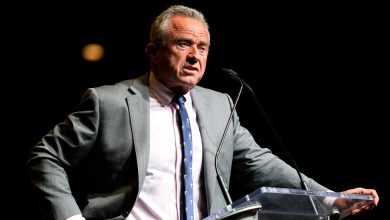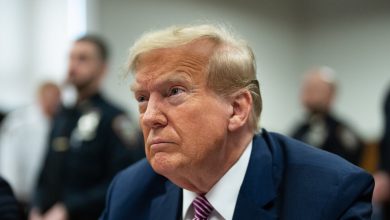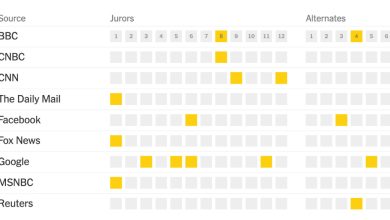
A Triathlon Champion’s Positive Test Jolts the Sport, Creating a Soap Opera
For the small, insular world of triathlon, it has been a week.
Last Monday, the International Testing Agency announced that Collin Chartier, a top American triathlete who had something of a breakout season last year, had tested positive for erythropoietin, commonly known as EPO, a performance-enhancing drug that has long been a favorite among endurance athletes.
EPO stimulates the production of red blood cells, which helps the body transport oxygen, ultimately increasing stamina. For years in professional cycling, it was about as common as saddle sores. Also, after more than two decades of doping scandals in nearly every sport, from track and field to baseball, most athletes, sports officials and fans have come to react to the latest positive test in the manner of Captain Renault entering Rick’s Cafe in “Casablanca.”
“I’m shocked! Shocked to find that gambling is going on in here.”
And yet, Chartier’s positive test, his acceptance of a three-year suspension from competition and his subsequent attempts — on one of the sport’s leading podcasts and on social media — to own the violation, have rocked triathlon, producing the kind of shock and outrage over doping that recall a more innocent era.
“It’s really blown up the sport,” said Dan Plews, who coaches several elite triathletes, including Chelsea Sodaro, the reigning Ironman world champion.
Sebastian Kienle of Germany, the 2014 Ironman world champion, pronounced himself “very sad and angry” over Chartier’s positive test.
Andrew Messick, the chief executive of Ironman, the leading organizer of triathlons internationally, described the sport as “a life-changing personal journey, not a win-at-all cost trophy,” and called Chartier’s positive test “an assault on our most fundamental value.”
Other triathlon veterans said that having nearly 20 years pass without a top athlete testing positive had led them to believe that triathlon was somehow different from other sports. An endeavor requiring athletes to swim, cycle and run as many as 140.6 miles, triathlon would figure to be ideally suited for chemically aided performance enhancement. But Timothy O’Donnell, a former long distance world champion, said most triathletes have long held the view that “the real race is against yourself.”
He continued: “For people focused on being the best version of yourself cheating doesn’t align with that goal. We’ve never been a big-money sport, so cheating was never really incentivized.”
Mark Allen, the six-time Ironman world champion and one of the sport’s first big stars, put it a little more poetically.
“The essence of triathlon is personally dreaming about super excellent levels of crazy stuff, but doing it cleanly,” Allen said “ Maybe it is naïve.”
Other elements to Chartier’s positive test and its aftermath have also turned the situation into a major pivot point and cast serious doubt over his performances last year. Chartier, who sought refuge in the mountains of Colorado late last week, said for now he has nothing further to say publicly beyond his Instagram post and his comments on Jack Kelly’s “How They Train” podcast, on which he has been prominently featured during the past year.
On those platforms, Chartier said he began taking EPO in November, following what he deemed a subpar performance at the Ironman world championships. Chartier said he was injured, sick and overwhelmed by the weight of expectations following his victory in the 2022 U.S. Open Cup, which earned him a $100,000 prize. Suspecting that his competitors were cheating, too, he viewed taking EPO as the only way he could compete at the highest level this year. He named no names and said he had no evidence to support his suspicions. He said he acted alone, researching how to take EPO and ordering it on the internet.
Chartier refused to make an “excuse like a tainted burrito or a tainted Covid vaccine,” he wrote on Instagram, derisively referring to previous explanations from other athletes for failed doping tests. “I made a terrible choice, and now it is time to face the consequences, own it and move on.”
‘This Is Super Upsetting for Athletes’
As far as the elite competitors and the devotees at the amateur level, triathlon’s small world, were concerned, Chartier had pulled the pin on a grenade, tossed it into the sport’s nerve center, then run, swam or cycled away.
Part of that had to do with the claim that he competed cleanly last year, when, after years of mostly unspectacular performances at shorter distances, he won the full Ironman race at Mont-Tremblant, Quebec, in August as well as the Professional Triathletes Organization’s U.S. Open Cup event. The U.S. Open victory in September delivered one the season’s biggest paydays in a sport where the opportunity to win significant prize money began only two years ago. Chartier said he planned to keep the money because he raced clean and did not test positive until February.
“This is super upsetting for athletes because of what he has stolen in prize money and recognition,” Sodaro said over the weekend. “He says he wasn’t doping during that period of time, that he started doping after those races and after Kona, but I think a lot of people are finding that pretty hard to believe.”
Part of it also had to with his claim that he had acted without any guidance.
“It’s said no one dopes alone,” Plews said. “I’m a physiologist, and I wouldn’t dope alone.”
That line of thinking has broad ramifications for the sport, especially given how Chartier voiced his suspicions about other elites. Chartier’s coach is Mikal Iden of Norway, whose brother, Gustav is the reigning Ironman world champion.
“He’s not a household name but that association with a household names damages the sport,” O’Donnell said.
In an Instagram post last week, Mikal Iden said he was “in shock and crying.” He added, “I can’t distance myself enough from this action. It’s such a complete crash in my values.”
Even triathletes with no direct connection to Chartier have found themselves playing defense.
Days after Chatrier’s positive test result, Sam Laidlow of France pulled out of the P.T.O.’s European Open in Ibiza, Spain, scheduled for this Saturday, citing “personal issues” in a social media post, including a move to a new house. Quickly, speculation circulated that a Laidlow positive test could be the next shoe to drop.
“If people question now a change of plan or me not showing up at a race and straight away put me in a box of being a cheat then that’s messed up,” Laidlow wrote in a follow-up post on Instagram. “I’ve worked really hard my whole life and my family and I have invested so much so you can’t say that freely with no foundation.”
Chris Kermode, the former leader of the men’s tennis tour who last year became the executive chairman of the P.T.O., said this was the dynamic he feared more than any other when took over the organization. With more money than ever now at stake in triathlon, fans and potential sponsors need to know the competition is “real” for the pro circuit to have any chance to grow and succeed.
The outrage within the sport did betray a certain naïveté, Kermode said Monday, but also showed the passion elite triathletes have for their endeavor.
“They were shocked, disgusted, and their message was loud and clear, that this is not endemic in the sport,” Kermode said. “In cycling it became something that was no surprise.”
He is determined to not let that happen in triathlon, and intends to have the leading experts in antidoping review his organization’s program.
“I don’t want ever to be in a position where people can pick holes in what we are doing,” he said.




